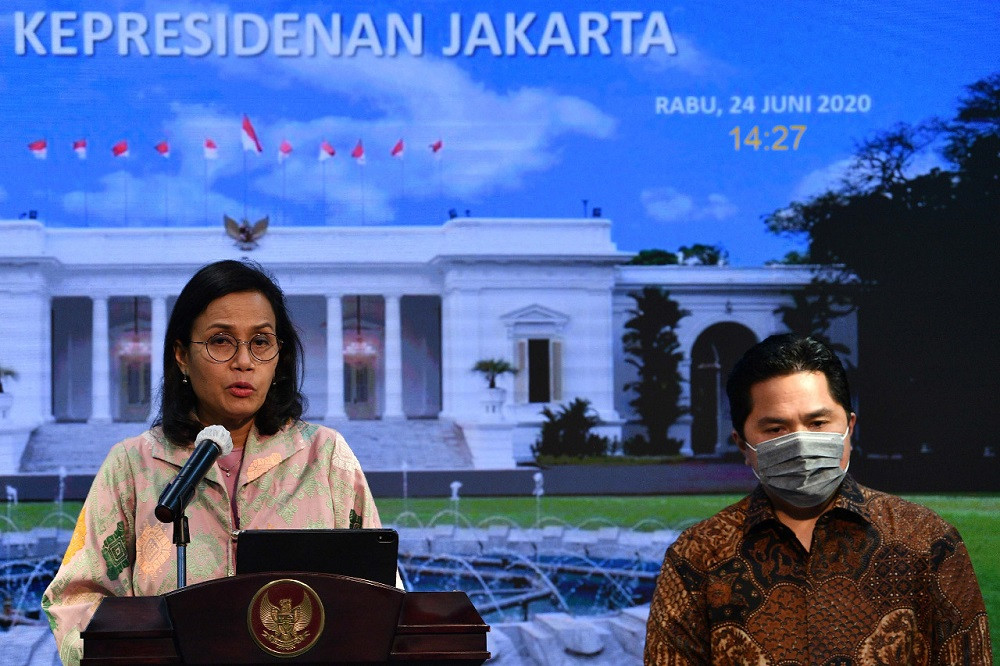Popular Reads
Top Results
Can't find what you're looking for?
View all search resultsPopular Reads
Top Results
Can't find what you're looking for?
View all search resultsThe stories of Sri Mulyani, Karen, Din and Ahok
These four people have had to fight those who want to monopolize the truth and do not tolerate any attempt to question their interpretation of what is right or wrong.
Change text size
Gift Premium Articles
to Anyone
 Hard cash: Finance Minister Sri Mulyani Indrawati (left) and State-Owned Enterprises Minister Erick Thohir announce the government’s placement of Rp 30 trillion (US$2.12 billion) in state banks on June 24. The funds will be channeled as loans to businesses to boost the real sector. (Antara/Sigid Kurniawan)
Hard cash: Finance Minister Sri Mulyani Indrawati (left) and State-Owned Enterprises Minister Erick Thohir announce the government’s placement of Rp 30 trillion (US$2.12 billion) in state banks on June 24. The funds will be channeled as loans to businesses to boost the real sector. (Antara/Sigid Kurniawan)
Y
ou may wonder why I named those four people in the headline of this column. They are prominent figures and among the country’s best talents. But they were once — and perhaps still are — victims of persecution and bullying perpetrated by the country’s political and economic oligarchs. These four people have had to fight those who want to monopolize the truth and do not tolerate any attempt to question their interpretation of what is right or wrong.
You should be familiar with Finance Minister Sri Mulyani Indrawati, who was formerly the managing director and COO of the World Bank. Karen Agustiawan is the former president director of state-owned oil and gas company Pertamina and has spent more than 30 years in the industry as a professional.
Din Syamsuddin is a former chairman of the country’s second-largest Islamic organization Muhammadiyah and the Indonesian Ulema Council (MUI). Basuki “Ahok” Tjahaja Purnama, a former Jakarta governor, now serves as Pertamina president commissioner.
Last week, I received a text message from an old friend who was very active in organizing special prayers for four Pertamina officials, including Karen and finance director Frederick Siahaan, during their trial at the Jakarta Corruption Court in 2019 and appeal hearings. She and her friends were confident that the four officials were innocent. She asked me to join the prayers and sent me a book, titled Life Application Study Bible, for that reason.
“God listens to your prayer. We must pray for other victims of persecution,” she said.
I did not have the heart to tell her that I forgot to ask God to perform a miracle for Karen.
The Attorney General’s Office arrested Karen on Sept. 24, 2008, for her alleged involvement in a graft case relating to Pertamina’s investment in Australia’s Basker Manta Gummy (BMG) Block in 2009, along with Frederick and two more accomplices. Prosecutors demanded 15 years in prison for each of them, claiming the case had caused Rp 568 billion (US$38 million) in state losses.
Karen had led Pertamina for five years until September 2014. During her leadership, House of Representatives members often bullied her with nasty words and questioned her capacity to lead the company. Journalists who regularly covered Pertamina knew why the politicians treated her badly.
An editorial published by The Jakarta Post criticized her arrest, saying: “The prosecution against the former president director of state oil and gas company Pertamina is questionable as it was carried out against the legal principles of business practices.”
The court found Karen guilty anyway and sentenced her to eight years in prison on June 10, 2019. However, she appealed and won.
Karen regained her freedom after the Supreme Court acquitted her on March 9, 2020.
“According to the justices, a director’s decision regarding a company activity is inviolable, even if the decision ends up costing the company. It is part of the risk of doing business,” said Supreme Court spokesman Andi Samsan Nganro.
In the last few several weeks, Din has become a source of controversy, including in two WhatsApp groups I am a part of. A group of Institute of Technology of Bandung (ITB) alumni had reported Din to the police, accusing him of radicalism.
Din attracted the police’s attention when he cofounded the Save Indonesia Coalition (KAMI) in August last year. He believes Indonesia under President Joko “Jokowi” Widodo has strayed from its founding principles.
“That is why we decided to step in and voice our opinion and thoughts,” said Din, who is also active in interreligious dialogues at the global level.
The police arrested eight KAMI members for allegedly spreading hatred in October last year and many others have felt intimidated and claimed to have been bullied by people who want to silence them.
“The police should bring Din to court because he wants to oust President Jokowi,” was the conclusion reached by members of my first WhatsApp group, which consists mostly of die-hard Jokowi supporters.
Conversations in the second WhatsApp group were more objective, and I relate more to their views.
“If it’s so easy [for the authorities] to persecute Din, who is a decorated figure, what could they do to other [critics of the President]?“ asked a friend, who has extensive global connections.
Sri Mulyani relinquished the second-highest post in the World Bank in July 2016 after about six years on the job. President Jokowi had repeatedly asked her to become his finance minister.
She joined the World Bank in May 2010 after resigning as finance minister for then-president Susilo Bambang Yudhoyono as a protest against his reluctance to protect her from attacks by political and business oligarchs, who had resented her stubborn refusal to compromise with them.
“I defined it as a victory because they failed to dictate me,” Sri Mulyani said after leaving the Cabinet in 2010, at a time when the Bank Century bailout case was gripping the country.
She returned gloriously to Jakarta in 2016, and until today, still serves as finance minister. She has proved her integrity and the world has recognized it.
What about Ahok? The North Jakarta District Court sentenced the then-Jakarta governor to two years in prison for blasphemy on May 9, 2017, less than one month after he lost the gubernatorial election to Anies Baswedan. It was very difficult even for the detractors and haters of Ahok to deny his achievements as governor. But the combination of his double minority — he is Chinese-Indonesian and Christian — and his sharp tongue ultimately sent him to jail.
The nation will lose more of its best talents if the elites continue to bully, silence or perhaps imprison them just because they voice the inconvenient truth the oligarchs hate to hear.
***
Senior editor at The Jakarta Post








